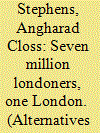|
|
|
Sort Order |
|
|
|
Items / Page
|
|
|
|
|
|
|
| Srl | Item |
| 1 |
ID:
077881


|
|
|
|
|
| Publication |
2007.
|
| Summary/Abstract |
An elaborate intellectual and policy framework has been constructed in order to preserve and protect "peace." The concept of peace is often used to refer to what Plato would have described as an "ideal form," or to depict a minimalist, realist-liberal version in which there is an absence of overt violence particularly between or within states. These common and differing usages illustrate that the concept of peace has generally been overlooked, and is often deployed in an ill-specified manner, while at the same time implying extraordinary levels of legitimacy. This article explores the consequences of not engaging with the concept of peace and outlines the possibilities inherent in opening up multiple conceptualizations of peace as a critical research agenda central to International Relations.
|
|
|
|
|
|
|
|
|
|
|
|
|
|
|
|
| 2 |
ID:
077880


|
|
|
|
|
| Publication |
2007.
|
| Summary/Abstract |
As a liberal relation of governance, development has a long genealogy spanning the colonial and postcolonial periods. This article attempts to uncover these interconnections. Development is first examined in terms of its singular ability to constantly reinvent itself as a "new and improved" formula for sharing the world with others. After discussing the relationship between development, liberal imperialism, and racism, decolonization is considered in relation to the emergence of a global biopolitical divide between "developed" and "underdeveloped" population. That is, life supported by social insurance as opposed to life excepted to be self-reliant. As a technology of security, development policies this divide. The article argues that the ability of effective states to declare a humanitarian emergency within ineffective ones has played a central role in the post-Cold War reexpansion of the West's external sovereign frontier. Since humanitarianism ignores the state, however, within liberal strategies of governance, consolidating this frontier has fallen to development. While respect for territorial integrity remains, sovereignty over life within ineffective states is now internationalized, negotiable, and contingent.
|
|
|
|
|
|
|
|
|
|
|
|
|
|
|
|
| 3 |
ID:
077879


|
|
|
|
|
| Publication |
2007.
|
| Summary/Abstract |
From the first half of the 1990s, and especially after the accession to European Union in 1995, immigrant authorities and administration have emphasized significance of immigrant associations in integration of immigrants in Finland. The purpose of the associations from the administrative perspective is to socialize and activate immigrant communities and individuals according to basic political rationalities, such as security of the society, happiness of the population and individuals, and cultural pluralism. On the one hand immigrant associations are technology through which integrative government of individuals and communities is implemented. On the other hand, associations themselves are governed through multiple techniques, mainly funding and registration. The author approaches this associational government of integration of immigrants with the "toolkit" applied from Foucauldian governmentality studies
|
|
|
|
|
|
|
|
|
|
|
|
|
|
|
|
| 4 |
ID:
077877


|
|
|
|
|
| Publication |
2007.
|
| Summary/Abstract |
This article explores the different ideas of community circulating in the aftermath of the 7 July 2005 bombings in London. Specifically, it compares the idea of a community in unity with a more cosmopolitan, urban idea of community. While these two ideas seem to present sharply different responses, the article questions the extent to which the cosmopolitan model offers an alternative to the nationalist idea of community. Drawing on various discussions about how ideas of community are produced through different understandings of time and origins, the article argues that in this specific case both the national and the cosmopolitan accounts of community worked according to a very similar logic, and therefore risked reproducing similar problems and exclusions. Consequently, the article suggests that the task of exploring alternative conceptions of community must involve greater sensitivity to the politics of time and other approaches to the politics of origins. This challenge is pursued through the motif of the city as a site expressing a different temporality and thus a different idea of community from that expressed in traditions of national belonging.
|
|
|
|
|
|
|
|
|
|
|
|
|
|
|
|
| 5 |
ID:
077878


|
|
|
|
|
| Publication |
2007.
|
| Summary/Abstract |
The shooting of Jean Charles de Menezes in Stockwell Station, South London, on 22 July 2005, was described as a "tragic mistake" by Metropolitan Police Commissioner Sir Ian Blair. This framing of the killing has come to dominate responses to it in the mainstream media. However, such a framing stymies critical questioning about what happened and colludes in the reproduction of a particular framework of understanding within which sovereign power has retrospectively valorized his death. By contrast this article reads the shooting as one of multiple responses of the British state to the bombings of the London transport network on 7 July 2005 and locates Menezes' death within the broader context of the global "War on Terror." Rather than a "mistake," the author argues that the shooting is symptomatic of systemic features of Western politics and in particular innovations in the ways sovereign power attempts to secure the spatial and temporal borders of sovereign political community
|
|
|
|
|
|
|
|
|
|
|
|
|
|
|
|
|
|
|
|
|